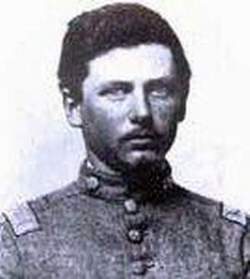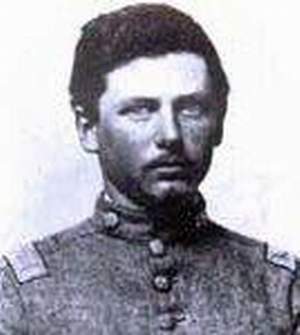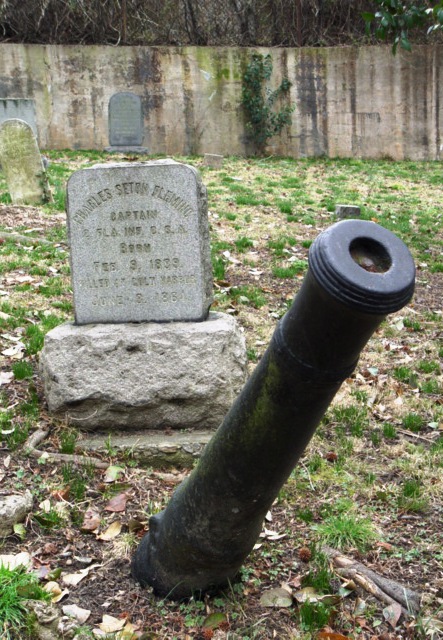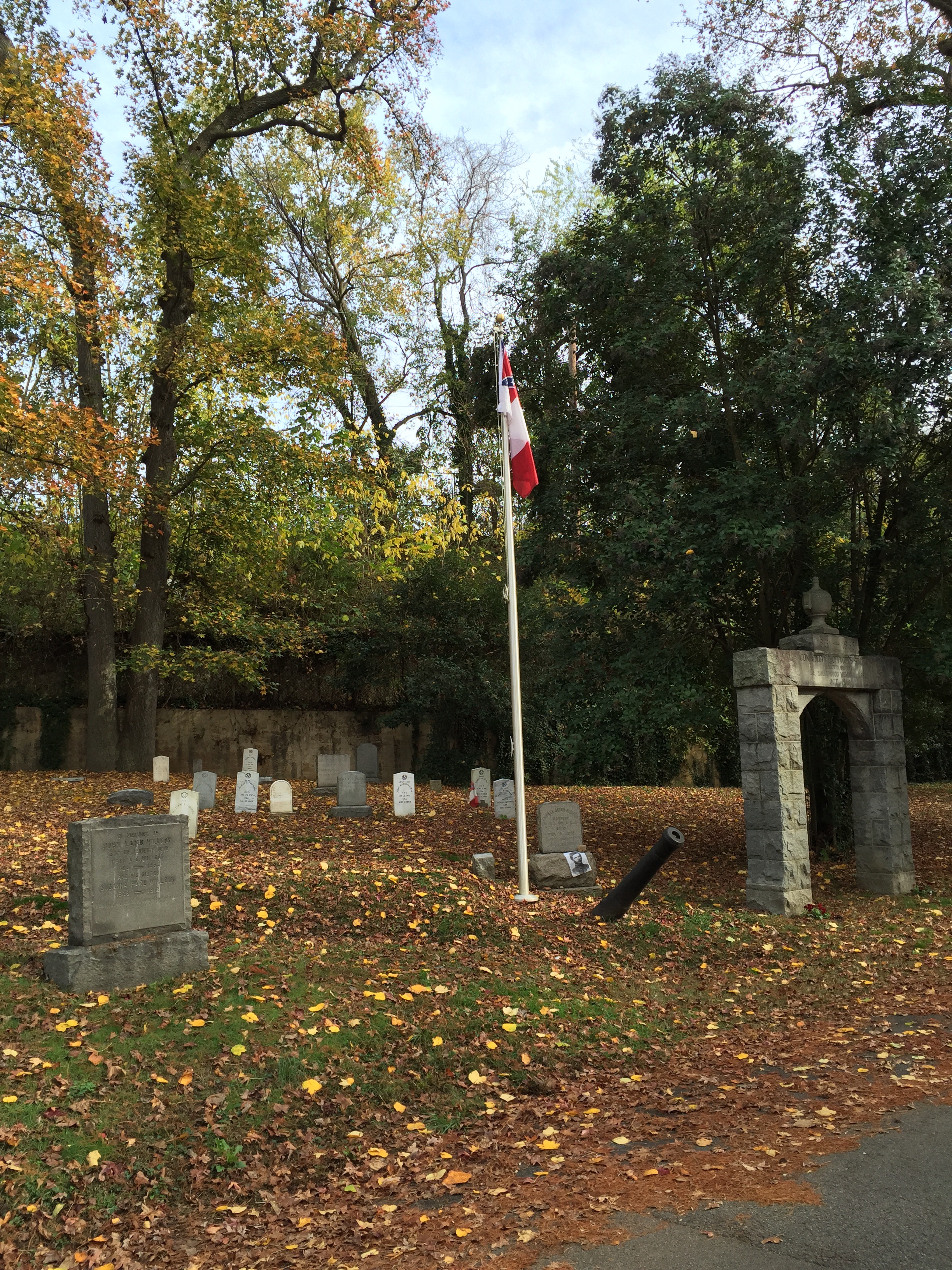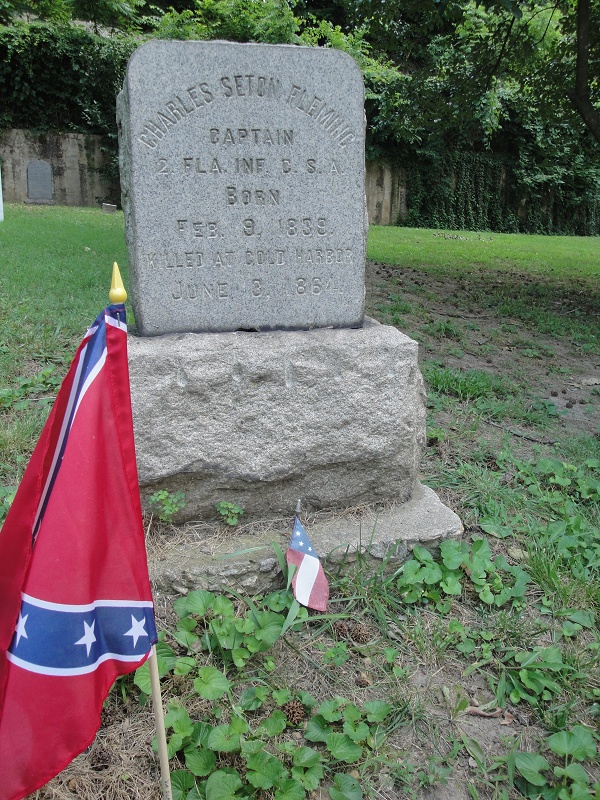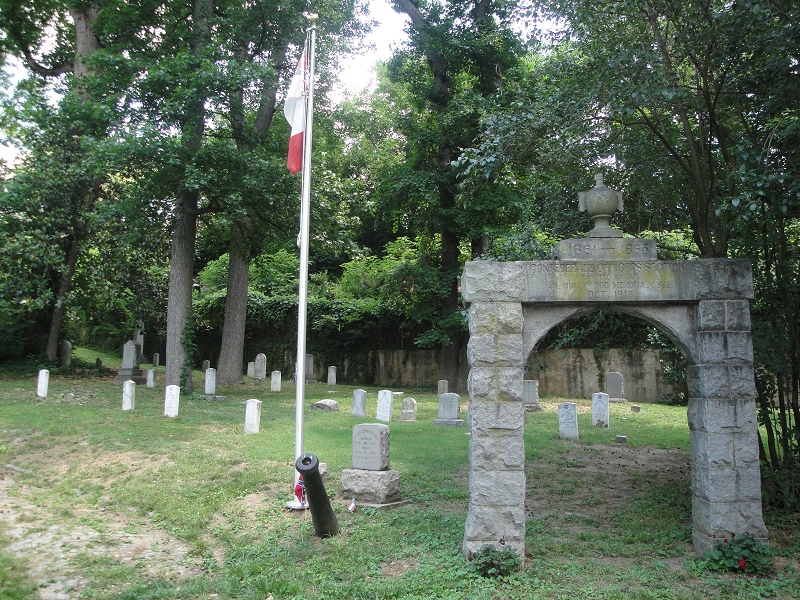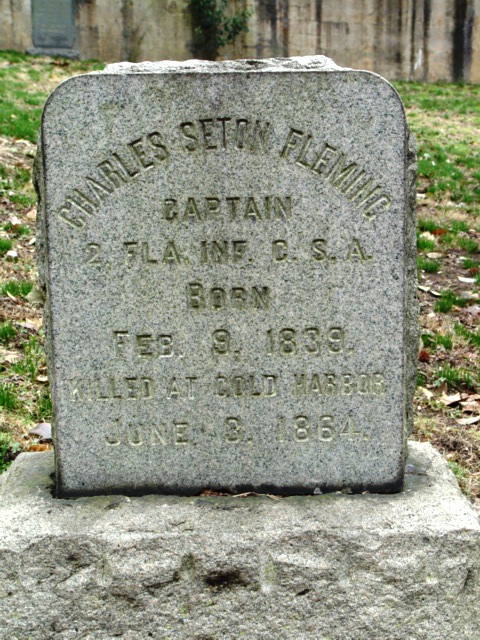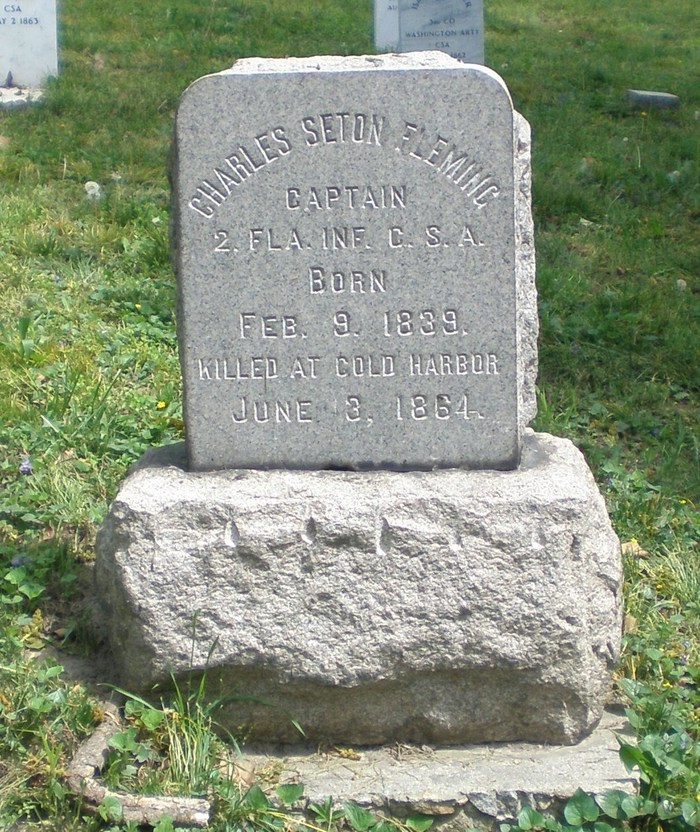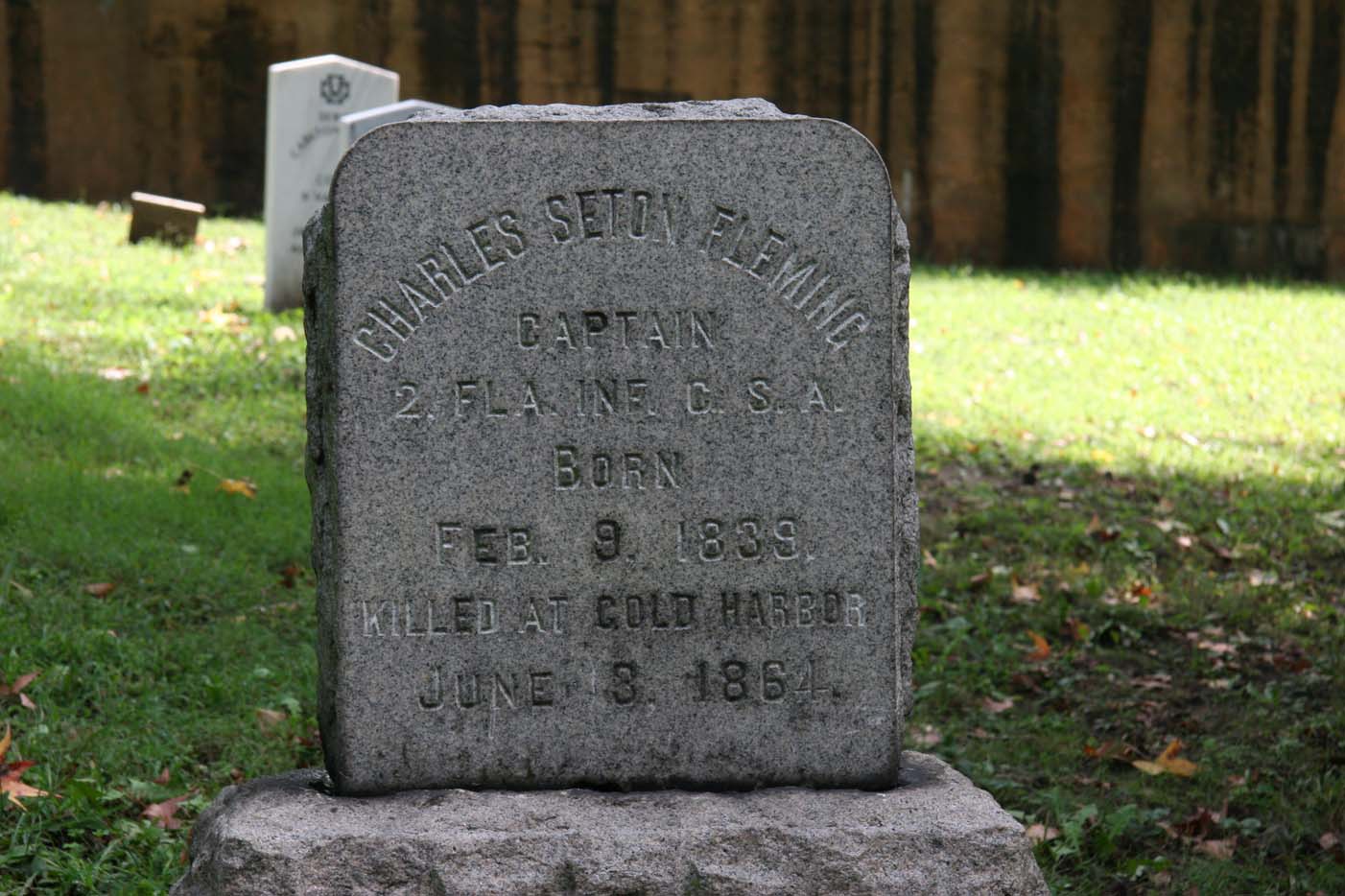--
Killed in a skirmish at Gaines Farm, Virginia, June 3, 1864, while leading a gallant charge at Cold Harbor. He was buried where he died on the battlefield. Twenty-nine years later on June 3, 1893 (Florida Governor), Francis Fleming found the burial site, extracted the body and moved it to Hollywood.
Ok - this bio is not by Garver. Somehow a bio by Garver got posted here, but it was not for Fleming. I tried to re-write what I did before, but the Garver thing stays. All this was sent by somebody else;
03/12/1861 ltr of recommendation from Sect. of War Smith for commission as 2nd LT; 07/13/1861, muster, Camp Virginia (12-mos-65 miles to rendezvous); 01 & 02/1862 muster/sick in hosp; POW/Ft Wool-near Ft Monroe VA-captured 05/05/1862-Battle of Williamsburg (wounded dangerously); 08/02/1862-sent up James River for prisoner xchg; 10/08/1862-appt'd Regimental Adjutant, upon death of Capt Flagg(05/50/1862)- a position he held from Flagg's DOD; 12/13/1862 Battle of Fredericksburg; 01 & 02/1863- muster/detached recruiting service; 02/??/1863-appt'd Capt; 02/03/1863-in Wayside/Gen Hosp #9, Richmond VA; 02/05/1863-on register of Med. Director's Ofc, Richmond; 05/3-4/1863 Battle of Chancelorsville; 07 & 08/1863-muster/cmd of regiment since 07/02/1863; 09 & 10/1863 muster-acting Brigade Inspector; 02/05/1864-on Register of Appointments-(to take rank 10/08/1862) appt'd under the Constitutional authorization vested in the President; 06/03/1864-killed in battle at Gaines Farm, VA & buried on battlefield; Brother to CSA Vets Francis Philip, Frederick Alexander, & William Henry Fleming
**info from www.fold3.com** PLESE NOTE: there were over 100 pages of records in this soldiers military file-many were damaged by water making them very difficult to read-Donna Meinscher Estes**
The following account is taken from the worthy tribute to a noble brother-- "The Memoir of Captain Charles Seton Fleming, of the Second Florida Infantry, C. S. A., by Francis P. Fleming (ex-Governor of Florida), Jacksonville, 1881," in which it forms Chapter VI, pp. 79-88, and Appendix G, pp. 121-4.
Charles Seton Fleming, the son of Colonel Lewis Fleming, a planter of Florida, of gentle Irish descent, was born near Jacksonville, February 9, 1839; educated in local private school, and in youth found employment in a mercantile house in Chicago, Ill. He evinced at an early age a preference for the profession of arms, and early in the year 1858, entered as a cadet "King's Mountain Military School" at Yorkville, South Carolina, the principal of which institution was Major Micah Jenkins, who afterward served with distinction as a General in the C. S. Army, "and fell a martyr to the 'Lost Cause' on the bloody field of the 'Wilderness' on the 5th of May, 1864."
Young Fleming attended this school until June, 1859. After serving for a time as the purser on a river steamer, he entered, in July, 1860, upon the study of law, in the office of his brother, Louis J. Fleming, in Jacksonville, Florida. In consonance with his instincts he was also a member of a local military company--the "Minute Men." In April, 1861, in the "momentous call of the period," he assisted in raising a company to form a part of the Second Florida infantry, designed as a representative regiment of his State, for service in Virginia. It was organized at Pulatka, early in May, with John W. Starke as captain, C. Seton Fleming, first lieutenant, Alexander Mosely (son of ex-Governor Mosely), senior second lieutenants and John E. Caine, a native of South Carolina, as junior second lieutenant. The Second Florida infantry entered the field by going into encampment at Yorktown, Va., on the 17th September, 1861.
In the sight of Yorktown, in the spring of 1862, the Second Florida, received its "baptism of fire" in a sortie in conjunction with the Second Mississippi battalion, made to dislodge a detachment of the enemy's sharpshooters near Fort Magruder; and in which they were successful.
As acting-adjutant of the Second Florida, in the engagement at Williamsburg, May, 1862, Lieutenant Fleming was severely wounded through the hip and was left in Williamsburg.
Upon the entrance of the enemy he fell into their hands, and in the latter part of July, was placed with other prisoners on the "Rip Raps" in Hampton Roads.
Having been exchanged, Fleming returned to his regiment to find himself without rank, the reorganization having taken place whilst he was a prisoner, and it was thought that he would not recover from his wound. He therefore took his place in the ranks of his old company, but soon after the second battle of Manassas, he was appointed Captain of company G, of the Second Florida, and participated in the investment of Harper's Ferry and the battle of Sharpsburg. Upon the return of Lee's army to Virginia the Florida regiments, the 2d, 5th and 8th were formed into a brigade and placed under the command of General Edward A. Perry. The brigade did gallant service at the battles of Fredericksburg, December 13, 1862; Chancellorsville, May 3-4, 1863; at Gettysburg, as detailed; at Bristow's Station, October 14, 1863, and in other engagements-- Captain Fleming constantly participating. He sealed his devotion to the cause he loved so well, being killed while leading the Second Florida, in the engagement near Gaines' Farm, Virginia, June 3, 1864. He was buried in the woods on McGehee's farm, but on June 3, 1893, his brother, ex-Governor Fleming, having found the grave, had the remains disinterred and placed in Hollywood cemetery, Richmond, where they now rest.] **info from www.gdg.org**
--
Suggested edit: In Gordon Rhea's 'Cold Harbor' he writes:
'Toward evening, Finegan decided to attempt once again to drive the Federals back from the salient. This time he gave the assignment to Captain Charles Seton Fleming's veteran 2nd Florida, augmented by elements from other veteran Florida regiments. The 2nd Florida had been gutted at Seven Pines, Gettysburg, and the Wilderness and numbered only about forty five men. Fleming was a handsome scion of a prominent Florida family-his brother Francis P. Fleming later became the state's governor-and the troops liked him. Finegan's order to repeat the attack that major Bird had already proved impossible took Fleming aback. Fully aware that the assignment was futile, he asked for confirmation of the order and learned to his astonishment that he had heard it correctly. "I have been told that the order was all a mistake and was not so intended," wrote Captain Tucker, who witnessed Fleming's reaction and was inclined to give Finegan the benefit of the doubt, "Probably a verbal order was passed down the line from mouth to mouth," Tucker surmised, "and some qualifying or optional directions were dropped in its transmission."
Leaning against the interior wall of the breastworks, Fleming took off his watch and handed it to a man next to him. He gave his pocket book and papers to Dr. Richard P. Daniel, the 8th Florida's surgeon and a close friend.
The he addressed his soldiers, telling them that he had been ordered to go, that he wanted them to follow, and that he expected this to be the last order he would ever give them. He exposed himself on the works while he talked, and a soldier warned him to be careful. "He remarked that it did not matter," a witness recounted, "'twas only the difference of a few moments." Fleming cast several glances toward Tucker, lying in agony between the traverses, but said nothing to him. "The occasion was too serious," Tucker recalled. "The crucial moment had come." At the signal, Fleming and his men vaulted over the works. "There was no touch of the elbow to give confidence and encouragement, no wild and exultant 'Rebel yell,' as with a massed brigade or division making a charge, to stimulate," Tucker observed. "There was neither impulsiveness nor excitement to dull the sense of peril. Their one and only consolation was consciousness of duty performed, however dire the consequences might be to themselves." Tucker summed up his impressions: "To my mind their behavior was superlatively heroic, and I much doubt if it has ever been surpassed."
Bravery was no shield from bullets. With a shout of "Good-by, boys," Fleming dashed forward and was immediately shot. Bullets cut his men down almost as soon as they emerged on the Union side of the works. A few days later, during a truce to collect wounded soldiers from between the lines, Alabamians found Fleming's body within thirty yards of the salient. Not a man who charged with him survived.'
Contributor: Travis Holt (48272081) • [email protected]
--
Killed in a skirmish at Gaines Farm, Virginia, June 3, 1864, while leading a gallant charge at Cold Harbor. He was buried where he died on the battlefield. Twenty-nine years later on June 3, 1893 (Florida Governor), Francis Fleming found the burial site, extracted the body and moved it to Hollywood.
Ok - this bio is not by Garver. Somehow a bio by Garver got posted here, but it was not for Fleming. I tried to re-write what I did before, but the Garver thing stays. All this was sent by somebody else;
03/12/1861 ltr of recommendation from Sect. of War Smith for commission as 2nd LT; 07/13/1861, muster, Camp Virginia (12-mos-65 miles to rendezvous); 01 & 02/1862 muster/sick in hosp; POW/Ft Wool-near Ft Monroe VA-captured 05/05/1862-Battle of Williamsburg (wounded dangerously); 08/02/1862-sent up James River for prisoner xchg; 10/08/1862-appt'd Regimental Adjutant, upon death of Capt Flagg(05/50/1862)- a position he held from Flagg's DOD; 12/13/1862 Battle of Fredericksburg; 01 & 02/1863- muster/detached recruiting service; 02/??/1863-appt'd Capt; 02/03/1863-in Wayside/Gen Hosp #9, Richmond VA; 02/05/1863-on register of Med. Director's Ofc, Richmond; 05/3-4/1863 Battle of Chancelorsville; 07 & 08/1863-muster/cmd of regiment since 07/02/1863; 09 & 10/1863 muster-acting Brigade Inspector; 02/05/1864-on Register of Appointments-(to take rank 10/08/1862) appt'd under the Constitutional authorization vested in the President; 06/03/1864-killed in battle at Gaines Farm, VA & buried on battlefield; Brother to CSA Vets Francis Philip, Frederick Alexander, & William Henry Fleming
**info from www.fold3.com** PLESE NOTE: there were over 100 pages of records in this soldiers military file-many were damaged by water making them very difficult to read-Donna Meinscher Estes**
The following account is taken from the worthy tribute to a noble brother-- "The Memoir of Captain Charles Seton Fleming, of the Second Florida Infantry, C. S. A., by Francis P. Fleming (ex-Governor of Florida), Jacksonville, 1881," in which it forms Chapter VI, pp. 79-88, and Appendix G, pp. 121-4.
Charles Seton Fleming, the son of Colonel Lewis Fleming, a planter of Florida, of gentle Irish descent, was born near Jacksonville, February 9, 1839; educated in local private school, and in youth found employment in a mercantile house in Chicago, Ill. He evinced at an early age a preference for the profession of arms, and early in the year 1858, entered as a cadet "King's Mountain Military School" at Yorkville, South Carolina, the principal of which institution was Major Micah Jenkins, who afterward served with distinction as a General in the C. S. Army, "and fell a martyr to the 'Lost Cause' on the bloody field of the 'Wilderness' on the 5th of May, 1864."
Young Fleming attended this school until June, 1859. After serving for a time as the purser on a river steamer, he entered, in July, 1860, upon the study of law, in the office of his brother, Louis J. Fleming, in Jacksonville, Florida. In consonance with his instincts he was also a member of a local military company--the "Minute Men." In April, 1861, in the "momentous call of the period," he assisted in raising a company to form a part of the Second Florida infantry, designed as a representative regiment of his State, for service in Virginia. It was organized at Pulatka, early in May, with John W. Starke as captain, C. Seton Fleming, first lieutenant, Alexander Mosely (son of ex-Governor Mosely), senior second lieutenants and John E. Caine, a native of South Carolina, as junior second lieutenant. The Second Florida infantry entered the field by going into encampment at Yorktown, Va., on the 17th September, 1861.
In the sight of Yorktown, in the spring of 1862, the Second Florida, received its "baptism of fire" in a sortie in conjunction with the Second Mississippi battalion, made to dislodge a detachment of the enemy's sharpshooters near Fort Magruder; and in which they were successful.
As acting-adjutant of the Second Florida, in the engagement at Williamsburg, May, 1862, Lieutenant Fleming was severely wounded through the hip and was left in Williamsburg.
Upon the entrance of the enemy he fell into their hands, and in the latter part of July, was placed with other prisoners on the "Rip Raps" in Hampton Roads.
Having been exchanged, Fleming returned to his regiment to find himself without rank, the reorganization having taken place whilst he was a prisoner, and it was thought that he would not recover from his wound. He therefore took his place in the ranks of his old company, but soon after the second battle of Manassas, he was appointed Captain of company G, of the Second Florida, and participated in the investment of Harper's Ferry and the battle of Sharpsburg. Upon the return of Lee's army to Virginia the Florida regiments, the 2d, 5th and 8th were formed into a brigade and placed under the command of General Edward A. Perry. The brigade did gallant service at the battles of Fredericksburg, December 13, 1862; Chancellorsville, May 3-4, 1863; at Gettysburg, as detailed; at Bristow's Station, October 14, 1863, and in other engagements-- Captain Fleming constantly participating. He sealed his devotion to the cause he loved so well, being killed while leading the Second Florida, in the engagement near Gaines' Farm, Virginia, June 3, 1864. He was buried in the woods on McGehee's farm, but on June 3, 1893, his brother, ex-Governor Fleming, having found the grave, had the remains disinterred and placed in Hollywood cemetery, Richmond, where they now rest.] **info from www.gdg.org**
--
Suggested edit: In Gordon Rhea's 'Cold Harbor' he writes:
'Toward evening, Finegan decided to attempt once again to drive the Federals back from the salient. This time he gave the assignment to Captain Charles Seton Fleming's veteran 2nd Florida, augmented by elements from other veteran Florida regiments. The 2nd Florida had been gutted at Seven Pines, Gettysburg, and the Wilderness and numbered only about forty five men. Fleming was a handsome scion of a prominent Florida family-his brother Francis P. Fleming later became the state's governor-and the troops liked him. Finegan's order to repeat the attack that major Bird had already proved impossible took Fleming aback. Fully aware that the assignment was futile, he asked for confirmation of the order and learned to his astonishment that he had heard it correctly. "I have been told that the order was all a mistake and was not so intended," wrote Captain Tucker, who witnessed Fleming's reaction and was inclined to give Finegan the benefit of the doubt, "Probably a verbal order was passed down the line from mouth to mouth," Tucker surmised, "and some qualifying or optional directions were dropped in its transmission."
Leaning against the interior wall of the breastworks, Fleming took off his watch and handed it to a man next to him. He gave his pocket book and papers to Dr. Richard P. Daniel, the 8th Florida's surgeon and a close friend.
The he addressed his soldiers, telling them that he had been ordered to go, that he wanted them to follow, and that he expected this to be the last order he would ever give them. He exposed himself on the works while he talked, and a soldier warned him to be careful. "He remarked that it did not matter," a witness recounted, "'twas only the difference of a few moments." Fleming cast several glances toward Tucker, lying in agony between the traverses, but said nothing to him. "The occasion was too serious," Tucker recalled. "The crucial moment had come." At the signal, Fleming and his men vaulted over the works. "There was no touch of the elbow to give confidence and encouragement, no wild and exultant 'Rebel yell,' as with a massed brigade or division making a charge, to stimulate," Tucker observed. "There was neither impulsiveness nor excitement to dull the sense of peril. Their one and only consolation was consciousness of duty performed, however dire the consequences might be to themselves." Tucker summed up his impressions: "To my mind their behavior was superlatively heroic, and I much doubt if it has ever been surpassed."
Bravery was no shield from bullets. With a shout of "Good-by, boys," Fleming dashed forward and was immediately shot. Bullets cut his men down almost as soon as they emerged on the Union side of the works. A few days later, during a truce to collect wounded soldiers from between the lines, Alabamians found Fleming's body within thirty yards of the salient. Not a man who charged with him survived.'
Contributor: Travis Holt (48272081) • [email protected]
Bio by: Garver Graver
